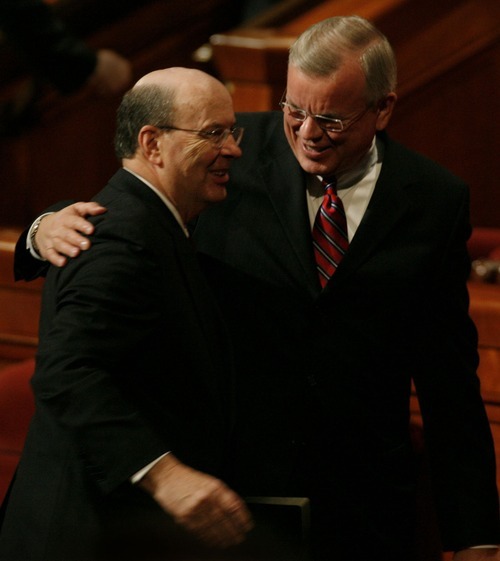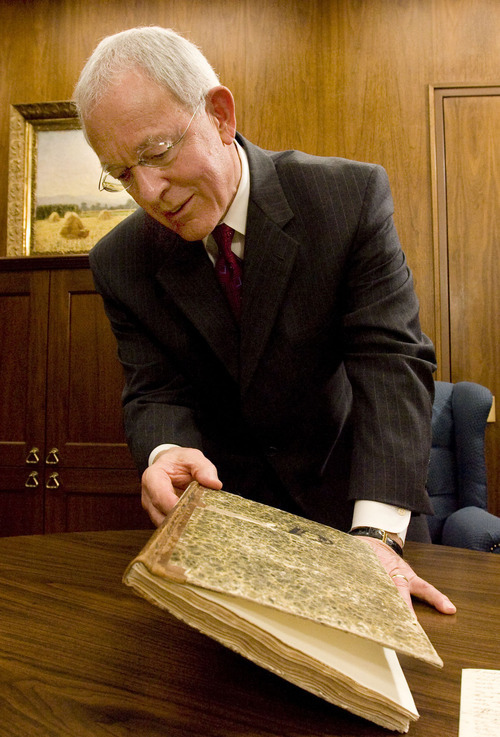This is an archived article that was published on sltrib.com in 2012, and information in the article may be outdated. It is provided only for personal research purposes and may not be reprinted.
LDS general authority Marlin K. Jensen was not a professional historian nor an academic, so when tapped as the church's official historian in 2005, he threw himself into the assignment.
He read scores of books, articles, professional journals and diaries. He attended Mormon history gatherings and other academic conferences. The self-effacing leader mingled with scholars, listening to and encouraging them.
By so doing, Jensen helped transform the Utah-based faith's approach to its history. He put thousands of its documents online, oversaw the groundbreaking Joseph Smith Papers Project, reorganized the staff and moved into a new state-of-the-art building. He also pushed for an honest telling of the Mountain Meadows Massacre and lobbied to make the southwestern Utah location of the 1857 siege a national historic site.
This week, the LDS Church's governing First Presidency announced that Jensen has been replaced as historian. He will turn 70 in May and, as is custom, will be made an emeritus general authority at the faith's subsequent Semiannual General Conference in October.
Church leaders named Steven E. Snow, a member of the church's Presidency of the Seventy and great-great-great-grandson of LDS apostle Erastus Snow, as Jensen's successor. The two will work side by side during the transition.
Mormon scholars are reeling at the change.
"Marlin Jensen has done more to further the cause of Mormon history than any person of the current generation," said Terryl Givens, an LDS writer and professor of literature and religion at the University of Richmond in Virginia. "He will be missed as much for the quality of his character as for his contributions. His unflinching honesty and his confidence that church history needed no whitewashing or sanitizing set the tone for a whole new generation of LDS academics."
Jensen "pulled all the church's resources together and put them all on the Web as fast as he could," said Jan Shipps, a Methodist and a leading expert on Mormon history."This is a change that is so epochal it would be very hard to turn it back."
As Mormonism moves into the mainstream, Shipps said, "it has to answer questions about its past. The effort to have those papers out there … is just amazing. … I have access to virtually everything I asked for."
But it was Jensen's ability to reach out to diverse communities with empathy that many will take away from his tenure.
"One reason that he has been so influential as the church historian and as a leader in the Mormon faith is that he wears his authority so lightly," said Philip Barlow, chairman of Mormon history and culture at Utah State University. "To a degree that I have not seen exceeded, his policies, his mind, his spirit and his winsome personal ways have inspired trust — the essence of faith — among wildly diverse constituencies."
Jensen became the church's point man on being a Mormon Democrat, assuring church members and the public in a probing interview with The Salt Lake Tribune that the two were not incompatible. He urged the Legislature to be "compassionate" in its approach to immigration. He also wept with gay Mormons in the Bay Area in the wake of the Proposition 8 ban on same-sex marriage, acknowledging their pain and offering a healing balm.
He provided a riveting account of his life and faith as well as thoughtful comments on some of the church's most difficult historical episodes to documentary filmmaker Helen Whitney in her 2007 PBS film "The Mormons."
With the Joseph Smith Papers, Jensen and his team won the respect of historians in and out of the faith, said noted Mormon scholar Richard Bushman, an emeritus historian at Columbia University in New York.
"Marlin set the bar for candor and openness and reliance on historical evidence for the whole church," Bushman said. "The most we can hope for is someone [as his successor] who is sympathetic to the historical enterprise and can sustain what we have accomplished so far."
Snow is up to the task, according to longtime friend and fellow attorney Jim Jardine.
The new historian has been an LDS general authority since 2001, but earlier served in several positions with the church, including bishop and mission president. During Jardine's time on the University of Utah's board of trustees, Snow was on the state Board of Regents.
"Steve has always had friends and colleagues among non-Mormons," Jardine said. "He has a generosity of spirit, is so respectful and open, he'll continue [Jensen's] wonderful relationships."
Snow is "not a narrow person," he said. "He will see historical issues in their full context. He is very, very bright and quick to learn."
Sounds like the way Jensen tackled the task. Historians are counting on the same from Snow.





